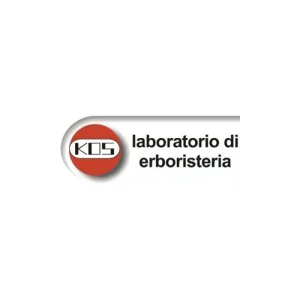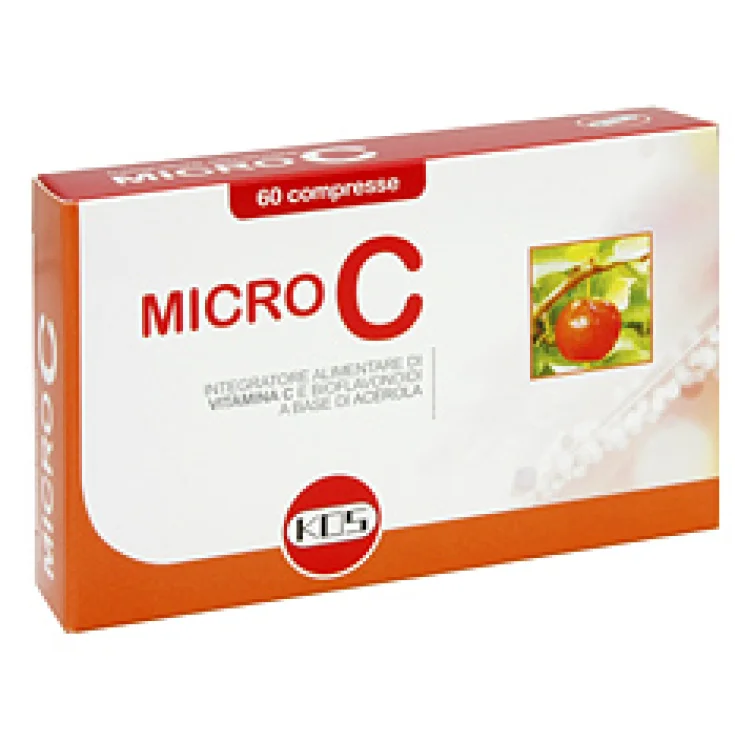Kos Micro C Food Supplement 60 Tablets

- Brand: KOS Srl
- Product Code: 907215519
- EAN:
- Availability: In 10 - 14 Days
- 3 items
for 9,58€ each - 4 items
for 9,39€ each - 5 items
for 9,19€ each
Kos
Micro C
Dietary supplement
Botanical denomination: Malpighia punicifolia L., M. emarginata, M. glabra -
Family: Malpighiacee
Synonyms: West Indian Cherry - Foreign Names: English - West Indian Cherry, Barbados Cherry; sp.- Escobillo
Parts used: ripe fruit without stone
Balsamic time: fully ripe
Extraction solvent: none, obtained by concentration of the juice -
Title: 50% vitamin C
COMPOSITION of the extract:
- vitamin C complex: factor C1 min. 50% (ascorbic acid), factor C2 (bioflavonoids such as pentahydroxy-3-flavanol)
- other vitamins: vit.A and vit. of group B in particular vit. B1, B6, PP
- minerals: in particular calcium and iron
Acerola is a small shrubby plant belonging to the malpighiacee family, native to Central America, it is easily found in clayey and humus-rich soils. Acerola is also known as West Indian Cherry, a name that derives from the similarity of the fruit similar to cherries. These fruits are sweet and slightly acidic; when the fruit is ripe, a juice with a very high concentration of vitamin C is obtained. The acerola is still the plant with the highest concentration of vitamin C, for this reason it is much appreciated by the modern herbalist culture. Modern herbal productions containing acerola use the dry extract as this form is able to guarantee the maximum amount of active ingredient. The standardized dry extract also manages to give a well-defined and invariable content over time. In this way, using a herbal product with dry extract acerola you will have the guarantee of using a product of invariable quality from processing to processing.
The fame of acerola is due to the high content of vitamin C. The content of ascorbic acid (vitamin C) is higher, for example, than that contained in orange, kiwi, pineapple, lemon etc. while as regards other characteristics, such as fibers, carbohydrates, minerals etc. there are no significant differences with other fruits.
Did you know that ...
Vitamin C plays an important role in the body. It is able to carry out numerous processes such as the transformation of folic acid, the transformation of transferrin, and is active in various syntheses such as collagen and bone matrix. The role it plays in the responses to stress and various viral infections is also important.
Vitamin C, however, has a short duration, is also largely expelled with the urine and the body is unable to create lasting reserves. The physiological level of vitamin C is 750µ / 100ml which in deficient conditions can reach 150-200µ / 100ml. This means that a balanced diet of vitamin C is especially important in physiological or environmental conditions that require greater use.
For this reason it is always recommended in winter to eat seasonal fruit, such as oranges and citrus fruits in general, in order to maintain a reserve of vitamin C useful for passing this particular period. However, even with citrus fruits our reserve may not be sufficient. For this reason, modern herbal producers have focused on acerola, precisely to give a product rich in vitamin C, therefore useful for a whole series of problems related to the winter season (and as we have seen, not only).
Vitamin C is particularly suitable for smokers. In fact, tobacco smoke stimulates the production of free radicals which are able to consume vitamin C.
The b ioflavonoids , also called vitamin factor P, are naturally present in fruit and vegetables and help to give the plant its color.
Chemically they consist of flavanolic heterosides which are capable of greatly enhancing the biological action of vitamin C, in particular as regards the anti-haemorrhagic and capillar-protective properties. In fact, lack of bioflavonoids leads to the same problems due to vitamin C deficiency, such as capillary fragility, small hematomas and bleeding of the gums. In certain physiological states or in convalescence, such as in periods of the year where a greater quantity of these substances is required, a natural reintegration with a greater use of fruit and vegetables in the diet and the use of supplements aimed at this purpose is recommended.
Bioflavonoids are generally extracted from citrus mesocarp of the genus Citrus: Lemon, grapefruit, orange (Citrus limonum L., C. maxima L., C. sinensis Osb. Et bigaradia Riss.). The title is in flavanolic heterosides of which hesperidin is present at about 40%.
Pack of 60 tablets






